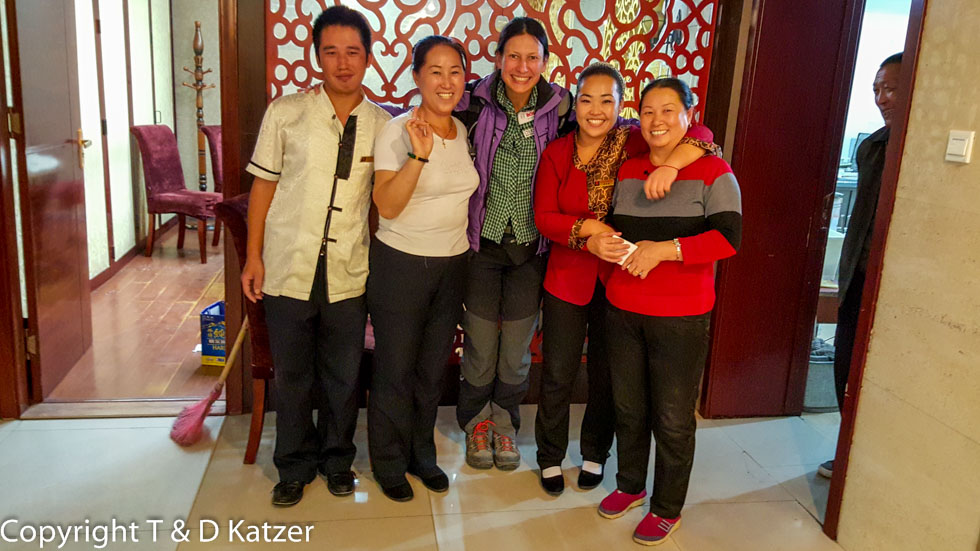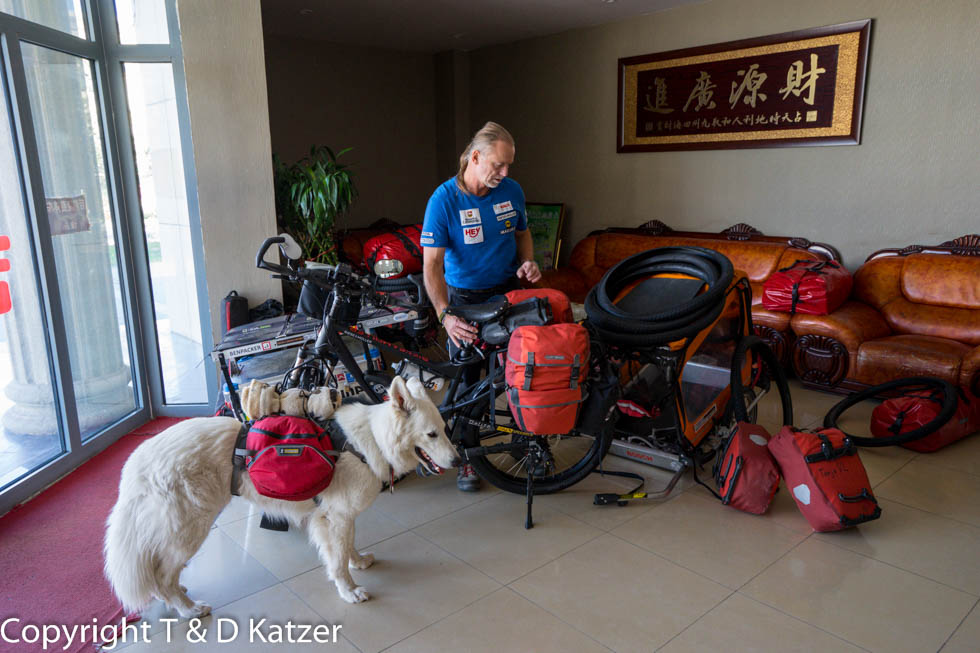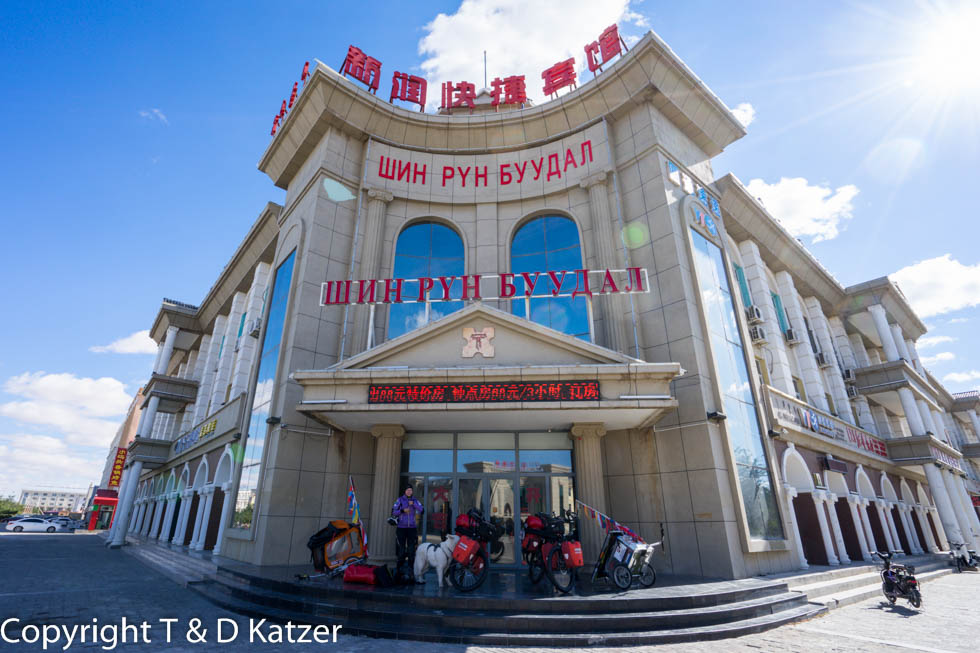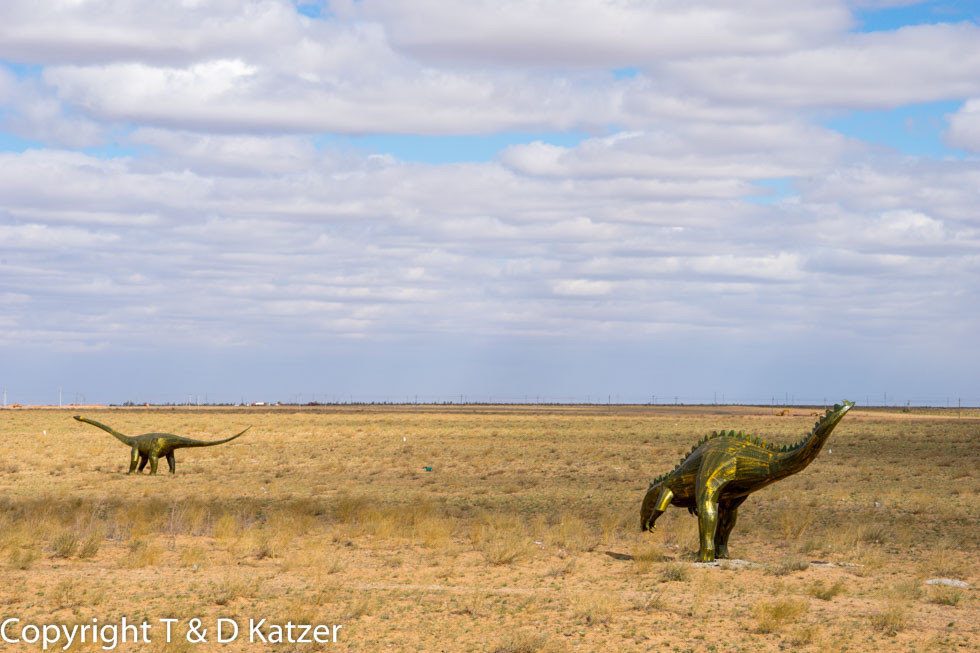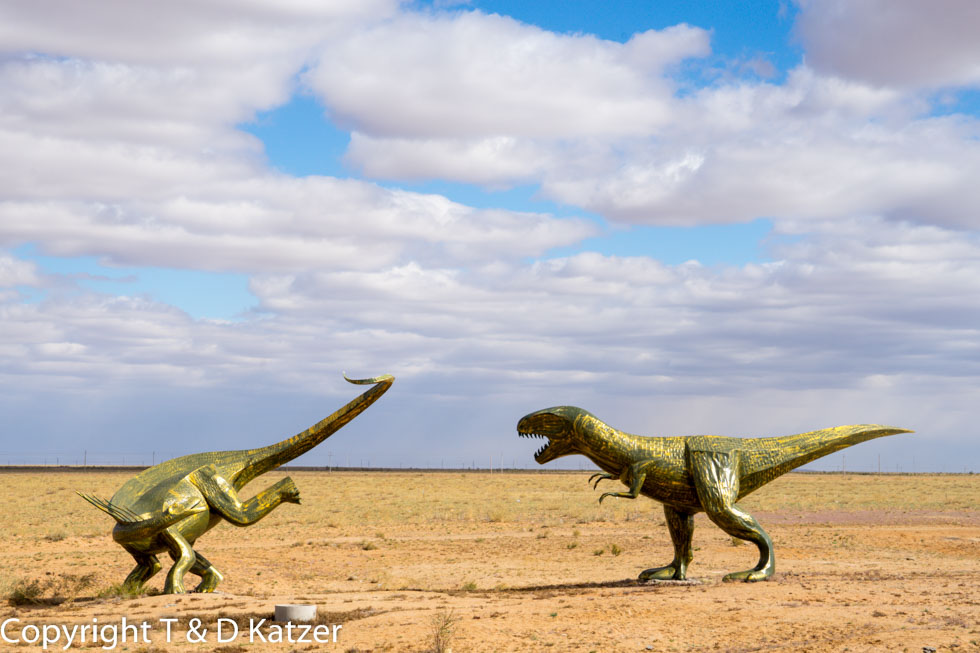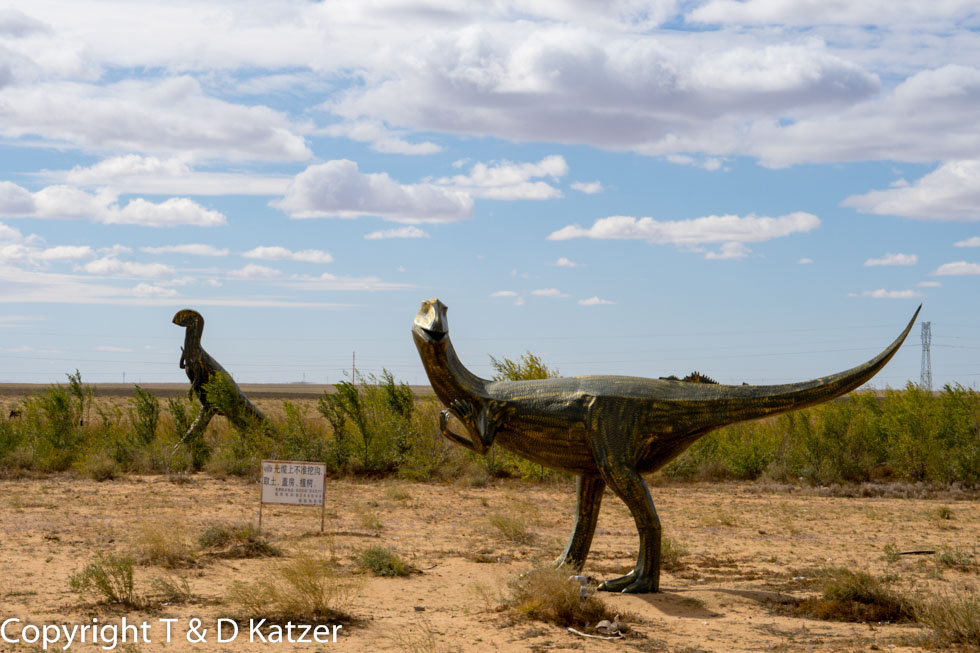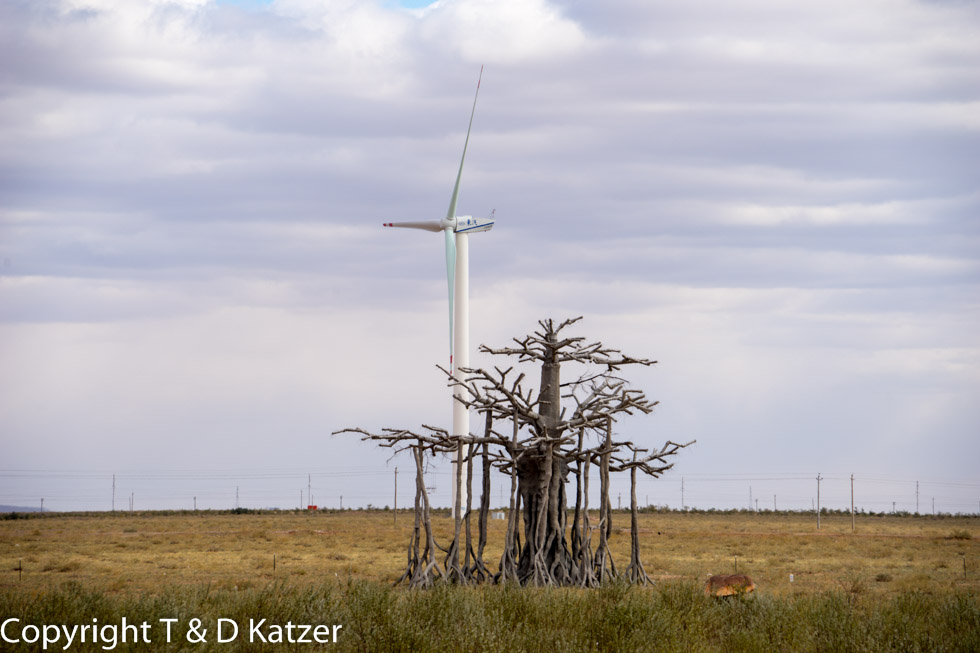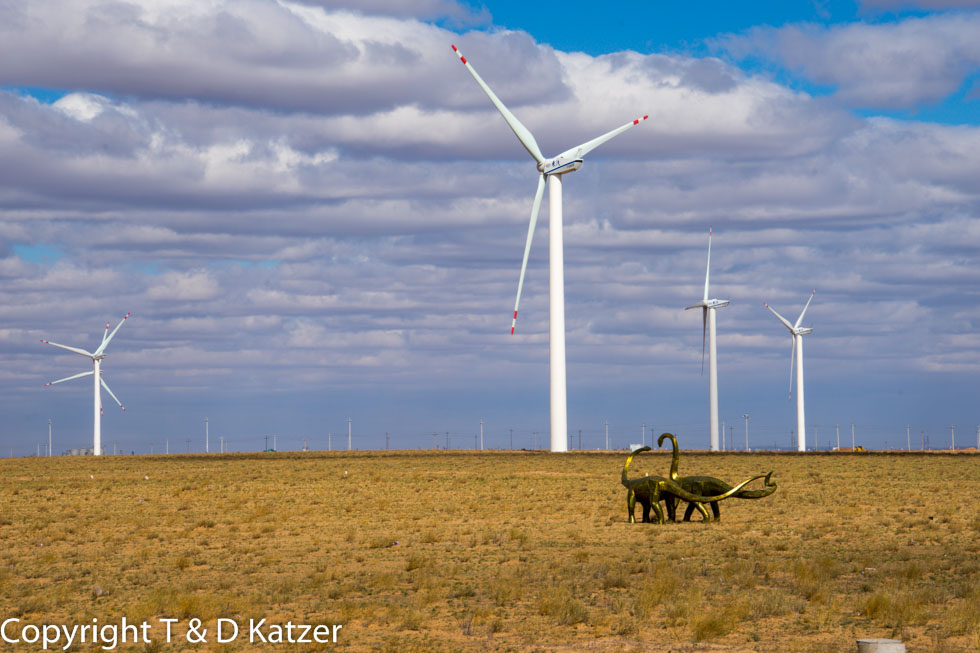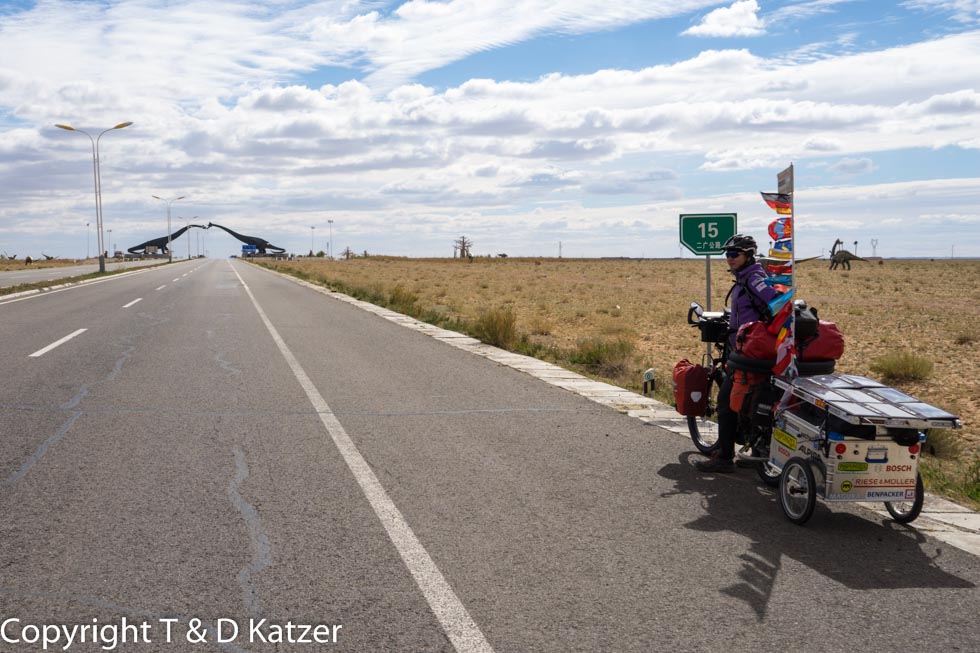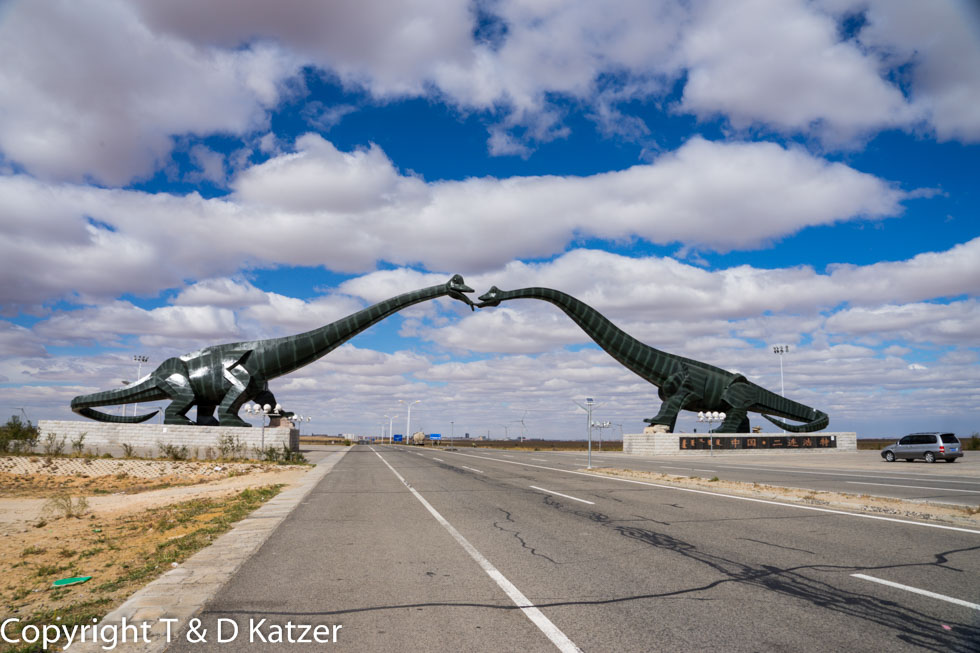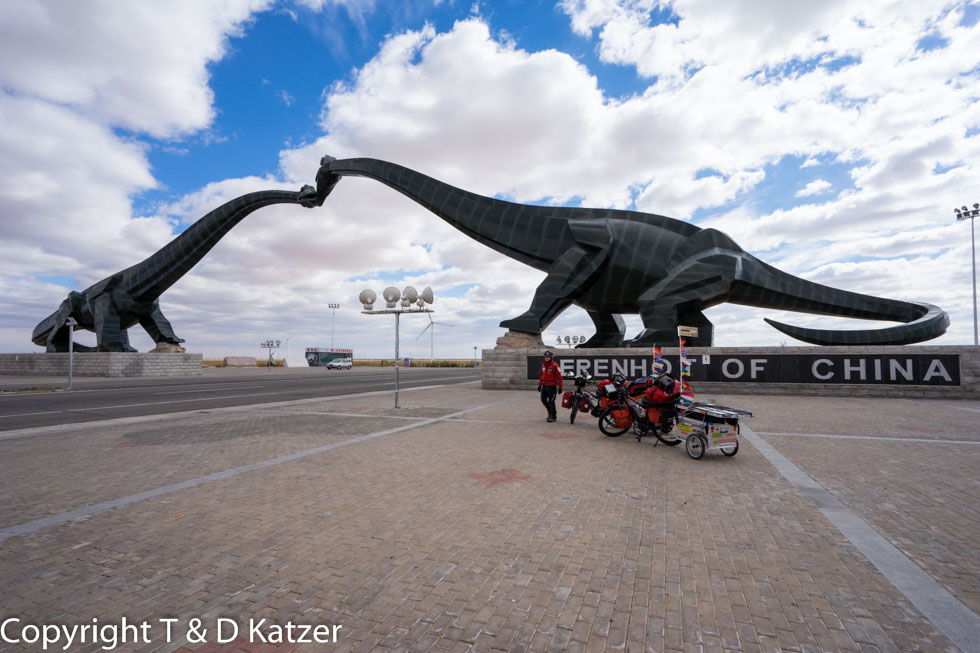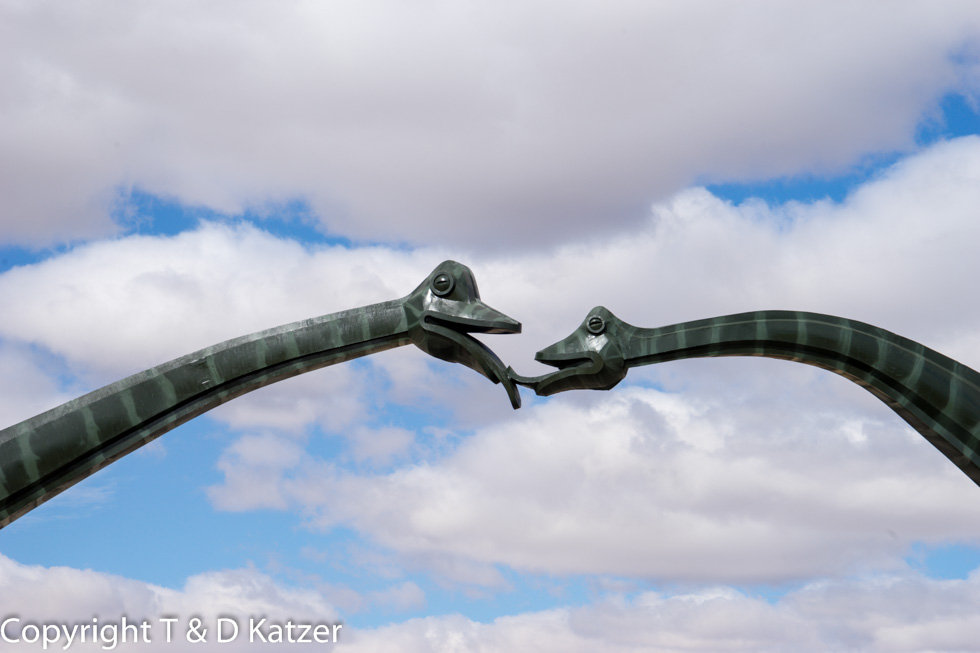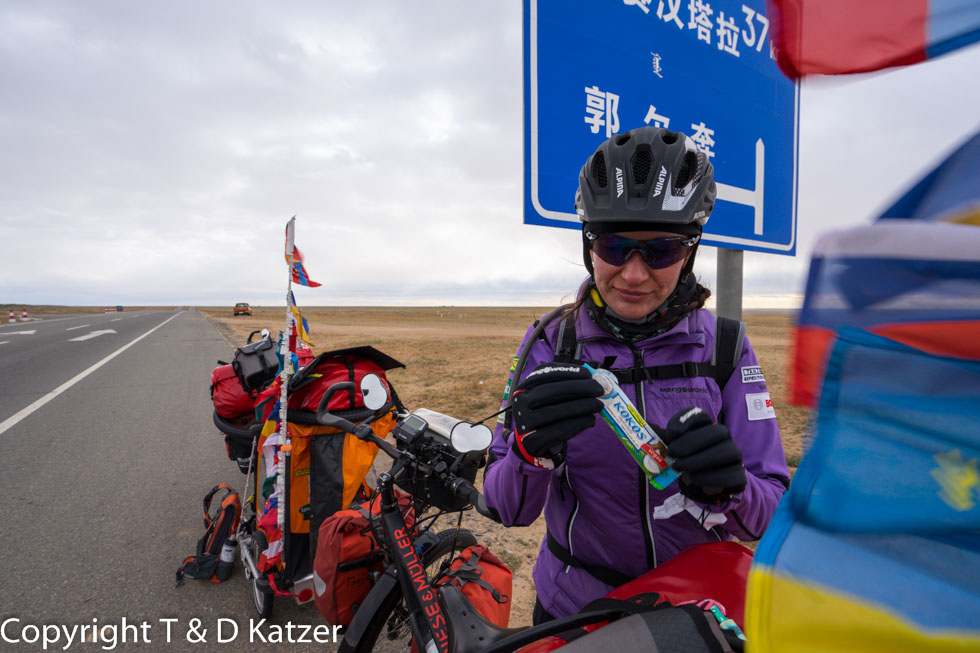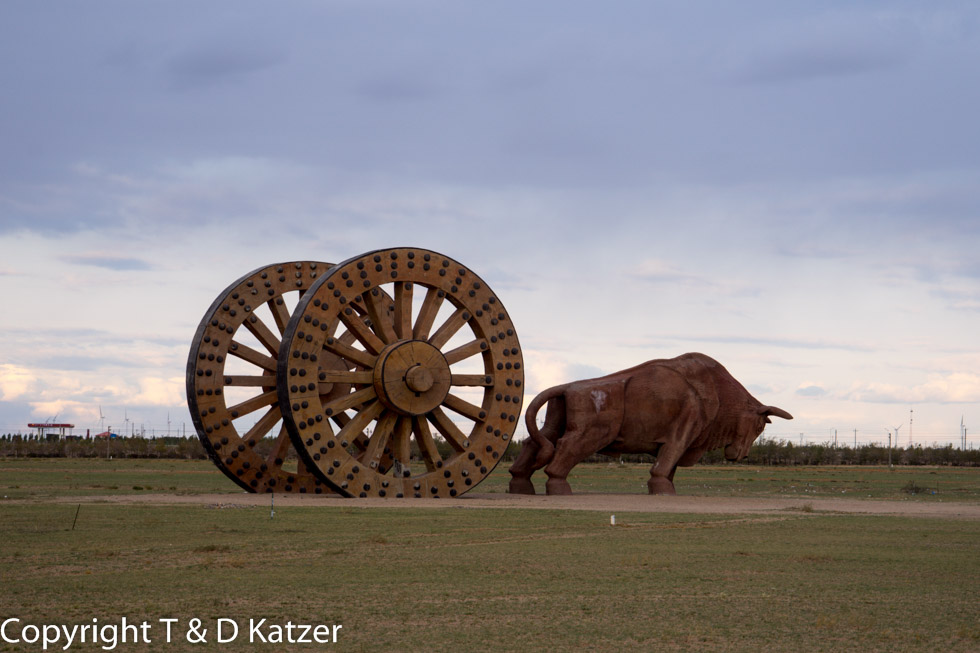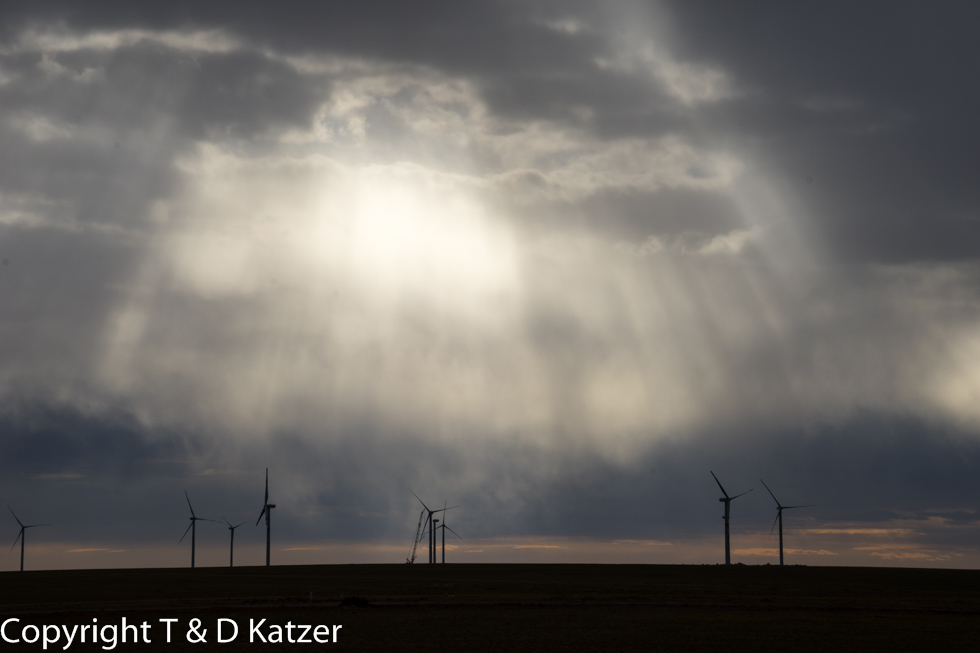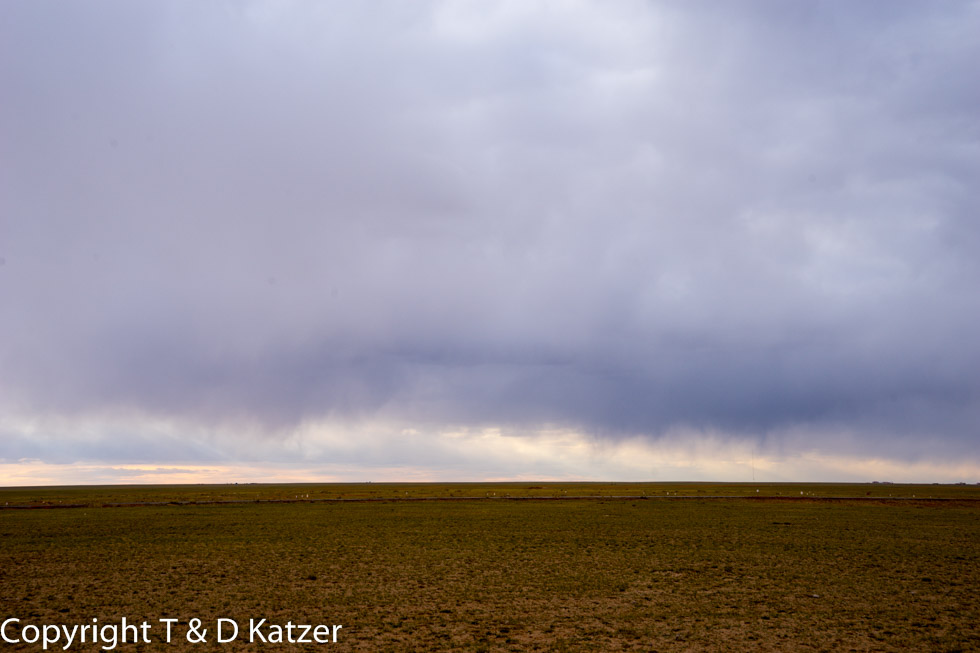
Icy squalls at your back
N 42°45'39.0'' E 112°38'42.2''
Date:
09.10.2015
Day: 103
Country:
China
Location:
Saihan Tal
Latitude N:
42°45’39.0”
Longitude E:
112°38’42.2”
Daily kilometers:
118
Total kilometers:
9,496 km
As the crow flies:
114
Average speed:
25,4
Maximum speed:
45 km/h
Travel time:
4:51 hrs
Soil condition:
Asphalt
Maximum height:
1.066 m
Total altitude meters:
4.475 m
Altitude meters for the day:
130 m
Tailwind Wind force: 7
53 km/h
Sunrise:
07:33 am
Sunset:
7:00 p.m.
Temperature day max:
12 C°
Temperature day min:
minus 2°C
Departure:
12:10 pm
Arrival time:
5:45 pm
Total plate tires:
7
Plate front tire:
2
Flat rear tire:
4
Plate trailer tire:
1
(Photos of the diary entry can be found at the end of the text).
After spending so long in Erenhot, loading the bikes is not easy for me. Above all, I have to think for a while about where to pack the seven extra spare coats, which unfortunately can’t be folded. At 11:30 a.m. we finished the job and loaded all our belongings onto the bikes and trailers. “It’s crazy what we have to lug around,” says Tanja. “Right, but what are we going to do? As you know, there’s nothing we can do without,” I reply, scratching my head. “Yes, yes, I realize that. I just hope the wheels don’t break down.” “Well, I hope so too.” The friendly receptionist opens the double doors so that we can push our heavy goods vehicles on two wheels outside. As soon as it is open, the icy wind blows into the lobby and sweeps a picture off the wall, which falls to the floor with a crash. The woman looks at us pityingly and shivers with cold. “You have to wear a face mask,” she admonishes Tanja.
According to the weather forecast, today is the coldest day yet. The extreme desert wind that blows across the border from Mongolia gets into our bones. Will we survive the coming winter with its bitter cold and merciless wind on our bikes? We shouldn’t have stayed here so long, I think. But because of the wait for the spare parts, we had no other choice, I calm my jumbled thoughts. Even though I always try not to get into a bad mood, I find it difficult under these conditions. “We’ll get through it”, Tanja’s words cheer me up a little. As a farewell to our three and a half week stay here at the hotel, we take a few photos in front of the impressive building. It was a wonderful place where we were treated very well. The city of Erenhot will also certainly remain in our fondest memories. Our experience was consistently positive right up to the last day. Tanja made friends with the park’s gardeners by taking Ajaci for a walk twice a day. She was greeted with a handshake by one or other of the shopkeepers. A newsagent even gave her a small notepad as a parting gift and vehemently refused to take any money for it. In our favorite restaurant, where we often went to eat hot pot, there were even group photos and lots of goodbyes. Yes, even the police who stopped Tanja yesterday afternoon during her walk with Ajaci and asked her for her passport reacted in a friendly manner when Tanja had no ID on her. “The documents are in the hotel,” she replied politely as always. “Which hotel?” the officers wanted to know. “Do you see? Over there,” Tanja pointed to the building just a few hundred meters away, whereupon the border police drove to the hotel to confirm Tanja’s statement.
With the power of the desert wind behind us, it blows us out of the city. Because I’ve put two tires over the saddle and luggage, we bump into them with the back of our thighs when pedalling. This takes energy, pushes our butts out of the saddle a little and is probably the reason why we can’t get our heavily loaded e-bikes to roll properly. “I don’t think that was a good idea!” exclaims Tanja. “I’ll think of something”, I reply, thinking about where else I could put the coats. Then we stop briefly, unload the rear end and I lash the tires between the saddlebags and the larger bag on top. They may protrude a little at the back, but our thighs can move freely from this point on. We immediately feel safer again and make good progress.
We are now on a four-lane, wide road that is very similar to a highway. Again and again I stop and try to find out via my map program MAPS.ME whether there is another way to get to the south. “It looks like this is the only road,” I explain. “But we’re not allowed to drive on a highway!” “Never mind, we have no other option,” I reply, because there is no exit and it would be inadvisable to turn back. As soon as Erenhot becomes smaller in the rear-view mirror, we find ourselves back in the middle of the Gobi Desert. Of course it doesn’t suddenly stop just because people have drawn a border between Mongolia and Inner Mongolia. Even though Inner Mongolia is “only” an autonomous region of China, with its almost 1.2 million km² it is almost 3 ½ times the size of Germany and although China is one of the most densely populated countries in the world, only around 25 million people live in Inner Mongolia. That means 20.51 inhabitants per km². In Germany, on the other hand, there are almost 11 ½ times as many inhabitants per km², at 235. This means that we will continue to encounter only sparsely populated land for the next 1,000 km.
“There’s a toll station up ahead!” I shout, pointing at the buildings stretching across the street. We approach the barriers with a slightly queasy feeling of being punished here. The officer greets us and waves us through in a friendly manner. “Well, that was easy,” I say with relief.
Dinosaurs suddenly appear to the left and right of the G208 highway. They are monumental metal sculptures that gleam golden green in the few rays of sunlight that penetrate the thickening cloud cover. “Wow, that looks crazy!” I exclaim enthusiastically, stopping my bike to take a photo of the creatures that once inhabited this region in large numbers. The giant animals from prehistoric times now accompany us for a few kilometers. The artists who designed them make them look so real that you would think they were actually moving. “If they were alive, they would have eaten us long ago!” I joke. “Look over there!” I hear Tanja exclaim enthusiastically. Two giant plant-eating Apatosaurus, which in their lifetime 150 million years ago could reach a length of 30 meters and weighed up to 30 tons, arch their long necks over the G208, forming an extremely bizarre arch under which the sparse traffic whizzes back and forth.
Whenever I stop to take a photo or just to catch my breath, the icy wind hits us with full force. I take out my anemometer and can hardly believe it: “Wind force seven!” I shout. “How much is that?” “The gusts reach up to 54 km/h,” I reply. “Just as well they hit us in the back.” In fact, this is a great stroke of luck for us, because the next place where we can charge our batteries is just 120 km beyond Erenhot. If we had this monster wind against us, we would definitely be stuck in the middle of the route. Because the risk of getting stuck on such lonely stretches in such sparsely populated country without electricity is very high, we have now communicated with Bosch. We have known for a few days that six of the new 500 watt batteries are on their way to the Middle Kingdom. This will give us enough energy to cover long distances even under difficult conditions. Tanja even suggested we keep our current 400 watt batteries. The additional 500 watt batteries would then represent a further increase in weight of around nine kilograms. per bike, but we will theoretically increase our range to 200 km. The thought that we won’t be stuck on such a route due to a lack of energy and that we won’t have to rely on roadside restaurants to charge our electricity collectors is extremely reassuring.
However, there are actually no charging facilities or filling stations on this route. In the meantime, the sky has darkened. It looks like snow. In the south, dark cloud plumes reach into the flat Gobi, which is covered only with sparse grass. In the west and east, countless wind turbines turn in front of menacing-looking cloud formations. The weather mood is extremely tense, to say the least, and this is already the ninth of October. After the stiff north wind has chased us for over four hours, we stop briefly to eat a muesli bar with a ravenous appetite. It only takes a few moments before we are completely frozen through, despite our windstopper clothing. Shivering and with ice-cold fingers, we jump into the saddles, still chewing, and speed on. We only swap battery 1 for battery 2 after 70 km. Then another Moutstation appears. Signs clearly indicate that bicycles are no longer permitted here. We follow a smaller road that branches off and leads us to the village of Saihan Tal. Because we can’t read the Chinese characters, we ask ourselves how we can recognize a hotel or simpler accommodation. We let our bikes roll into the village with trepidation as to whether we will find a place to stay for the night. “Over there! That looks like a hotel, doesn’t it?” I shout. We haven’t even got off the saddle when a Chinese woman hurries towards us and asks us in sign language whether we want to eat or sleep? “Both,” I reply in sign language. We are immediately invited into the inner courtyard. As soon as our roadtrains are on the stand, several Chinese people run over to take photos of us with their cell phones. A very eager older man shows me the rooms. They are surprisingly beautiful. There is even a bathtub in the bathroom where a hot bath beckons. “How much does it cost?” (Zhe duoshao qian – To keep it as simple as possible, the Chinese words in brackets are not marked with the four different tone characters, i.e. dashes above the respective letters. If you pronounce the words as written in brackets, no Chinese person will understand) I ask, trying to use my little bit of Chinese. Unfortunately, none of those present understands me. As already mentioned, we studied Chinese for three semesters. However, we have to realize that we are hardly understood or not understood at all because of the wrong pronunciation. Chinese is a tonal language. In addition to the neutral tone, there are four basic tones. Each syllable carries one of these five tones. In addition to the pronunciation of a syllable, the sound is also decisive for the meaning. This means that words with the same pronunciation but different sounds have different meanings. For example: ba means eight, pull, grip or father, depending on the stress.
“Look here, please,” Tanja waves the old man over. Since we have known since Erenhot that our Chinese sounds Spanish to the Chinese, the sentences written down by Spring come into play. “Ah,” says the friendly old man. “100 yuan” (€13.87). Tanja points: “Can we take our dog into the room?” “shide”, (yes) he answers and nods his head. The question of whether we can take our bikes into the house is now too complicated for us. “We’ll take the room,” I say with relief after the price is right, our dog is allowed in and the people are exceptionally friendly. While I unload the equipment from the bikes, Tanja and the old man carry everything inside. Then, when I have unhitched the trailers, I ask if the bikes can go inside the small accommodation. The man nods with a friendly smile and helps me to carry these and the pendants inside. As soon as we are sheltered from the icy wind, Tanja pays for the room in advance, as is customary here. “I get 100 yuan per person,” is the astonishing statement from the nice man. “Do you think he wants to cheat us?” asks Tanja. “I somehow don’t think so. I think it’s a communication problem,” I reply. Because we have already unloaded everything, are tired and frozen, the sun is already setting and the temperature has dropped below zero, we pay the 200 yuan (27.72 €). The Chinese man laughs peacefully but not as if he has made a big deal with us and hurries into the room to adjust the TV. “That’s not necessary,” I was about to say, as we don’t want to watch a Chinese program anyway, when Ajaci unabashedly vomits a mega load on the wooden floor. The huge puddle, in which the remaining fish balls from yesterday’s meal, undigested carrots and other things are still floating around, spills onto the man’s heels. He is still busy setting the right channel and doesn’t notice that the heels of his shoes are already flooded. Tanja and I look at each other in horror. “Rags?” I whisper. Tanja has the presence of mind to pull Ajai’s large blue towel out of his rucksack and throws it over the foul-smelling lake. The spread of odors is immediately stopped for the time being. The cloth becomes saturated. As if nothing were wrong, Tanja and I stand on the cloth and look at our host, who turns around at this moment with a satisfied smile. He really hasn’t noticed anything, I think. The eager man then wants to adjust the lights, which can be operated via a console, when Tanja takes him kindly by the arm and says: “Do you have wifi here? I need the code.” “Shide”, (yes) he says and leaves the room with Tanja. “Phew”, I say, grabbing the soaked towel and throwing it into the bathtub. As soon as the floor has been roughly wiped, the little Chinese man appears again to explain the console that controls the lights and sockets. Now certain that he has explained everything to the best of his knowledge, he leaves the room again. Suddenly the bathroom is under water. We call the old man again and he acts immediately. Minutes later, he and the chef from the restaurant next door are standing in our room. The chef is dressed in white, as is customary for chefs, and wears an incredibly tall, white chef’s hat. It is armed with a ten-meter-long steel cable that looks like it could be used to clean pipes. The two of them are now slaving away in our bathroom, making a lot of noise. Then a pump is brought in to pump something through a pipe. 15 minutes later, the damage is repaired and the flooding is under control.
At 19:00, after I have written my short notes of the day and the pictures are captioned, we go to the restaurant next door. Still frozen from the cold of the day, we sit in the restaurant and ask for the menu. “I only understand Chinese,” I say to Tanja, smiling and pointing at the Chinese characters. We call the waitress. She understands that we don’t understand anything and comes rushing over with a tablet PC. In fact, some of the dishes are illustrated. “Oh man, this is a really expensive place,” I say after every meal soon costs between eight and ten euros. The beer is also twice the price of most pubs in Erenhot. “Look at the white tablecloths. They look classy here,” says Tanja. We end up ordering vegetables, rice and a soup. When the soup is served, I grimace. “What’s going on?” asks Tanja. “Reminds me a lot of Mongolia. It’s full of rancid meat.” “Well then, Ajaci is happy,” she replies with a laugh.
After a meal that I find unsatisfactory, we retire to the cold room. As most accommodation in China does not seem to have heating, the air conditioning is used for heating. Unfortunately, the thing doesn’t work properly. Something has seized up in the engine and is squeaking deafeningly. “And how far is it to the next charging station tomorrow?” asks Tanja, who has crawled under the comforter. “After just under 50 km, there is a small village. On the map, however, it looks more like a hamlet with only two or three houses. I don’t know if there’s anywhere to stay overnight. The next larger settlement is Baiyinchagan. They certainly have accommodation there, but it’s 154 km away.” “154 km? Oh dear, that’s a long way.” “Yes, it is. But if the tailwind stays like this, we’ll make it with our batteries. It will still be a long and hard day”….
The live coverage is supported by the companies Gesat GmbH: www.gesat.com and roda computer GmbH www.roda-computer.com The satellite telephone Explorer 300 from Gesat and the rugged notebook Pegasus RP9 from Roda are the pillars of the transmission.
